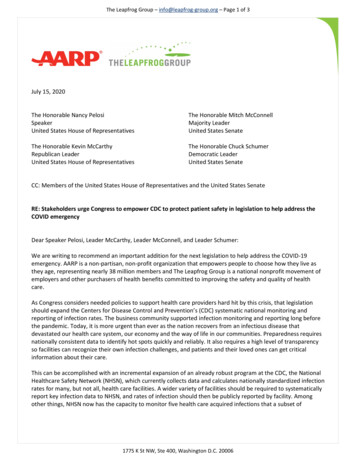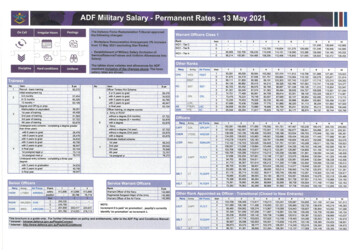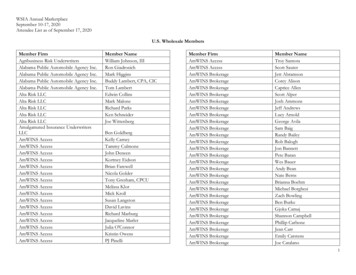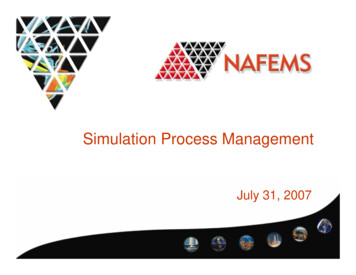
Transcription
The Leapfrog Group – info@leapfrog-group.org – Page 1 of 3July 15, 2020The Honorable Nancy PelosiSpeakerUnited States House of RepresentativesThe Honorable Mitch McConnellMajority LeaderUnited States SenateThe Honorable Kevin McCarthyRepublican LeaderUnited States House of RepresentativesThe Honorable Chuck SchumerDemocratic LeaderUnited States SenateCC: Members of the United States House of Representatives and the United States SenateRE: Stakeholders urge Congress to empower CDC to protect patient safety in legislation to help address theCOVID emergencyDear Speaker Pelosi, Leader McCarthy, Leader McConnell, and Leader Schumer:We are writing to recommend an important addition for the next legislation to help address the COVID-19emergency. AARP is a non-partisan, non-profit organization that empowers people to choose how they live asthey age, representing nearly 38 million members and The Leapfrog Group is a national nonprofit movement ofemployers and other purchasers of health benefits committed to improving the safety and quality of healthcare.As Congress considers needed policies to support health care providers hard hit by this crisis, that legislationshould expand the Centers for Disease Control and Prevention’s (CDC) systematic national monitoring andreporting of infection rates. The business community supported infection monitoring and reporting long beforethe pandemic. Today, it is more urgent than ever as the nation recovers from an infectious disease thatdevastated our health care system, our economy and the way of life in our communities. Preparedness requiresnationally consistent data to identify hot spots quickly and reliably. It also requires a high level of transparencyso facilities can recognize their own infection challenges, and patients and their loved ones can get criticalinformation about their care.This can be accomplished with an incremental expansion of an already robust program at the CDC, the NationalHealthcare Safety Network (NHSN), which currently collects data and calculates nationally standardized infectionrates for many, but not all, health care facilities. A wider variety of facilities should be required to systematicallyreport key infection data to NHSN, and rates of infection should then be publicly reported by facility. Amongother things, NHSN now has the capacity to monitor five health care acquired infections that a subset of1775 K St NW, Ste 400, Washington D.C. 20006
The Leapfrog Group – info@leapfrog-group.org – Page 2 of 3American hospitals are required to publicly report (for inpatient care only) as a condition of participation inMedicare. The five health care associated infections currently collected include: Methicillin-resistant Staphylococcus aureus (MRSA) Clostridium difficile (C.Diff) Surgical Site Infections After Colon Surgery (SSi -Colon) Central Line-Associated Bloodstream Infections (CLABSI) Catheter-Associated Urinary Tract Infections (CAUTI)Recently, many facilities were also required to report rates of COVID-19 cases among patients and staff. CMShad to develop a reporting mechanism with NHSN to begin reporting infections and deaths in the nation’s15,400 nursing homes, but it couldn’t be put into place until May. Within a month, almost 100 percent of thesenursing homes are reporting COVID-19 cases and deaths among residents and staff, as well as PPE supply dataand access to COVID-19 testing to NHSN. Having a monitoring mechanism in place for infections in nursinghomes sooner would have made this a less burdensome process. Similarly, more than 60 percent of hospitals inthe country are voluntarily reporting COVID-19 data and the strain on their resources to CDC’s NHSN. Thisreporting needs to become more complete to develop a true national picture of the burden of disease onpatients and the health care system.Currently, NHSN has the capacity and protocols in place to collect and calculate standardized infection ratios(SIRs) for the full range of health care facilities in the United States and its territories, but only some generalhospitals are required to report this infection data, and only for inpatient care. NHSN has the capacity to collectinfection data for long term care facilities, rehabilitation facilities, hospice facilities, ambulatory surgery centers(ASCs), hospital outpatient surgery departments, specialty hospitals, pediatric hospitals, critical access hospitals,Veterans Affairs and military hospitals, dialysis centers, hospitals in Guam and Puerto Rico and other territories,and other facilities—but it is not currently required that these facilities report infection data, and most facilitiesdon’t volunteer it. We recommend requiring this reporting as part of the next COVID-19 emergency legislationand including assisted living and other long-term care facilities as part of such reporting. Health care systemsneed and deserve support, and the public needs and deserves accountability for the support their government isproviding.The main advantages of this national collection and reporting effort are to: Prepare for any future outbreak: A focus on health care acquired infections is the most flexible andeffective method to account for preparedness for any contagious disease that may threaten us in thefuture. To prevent health care acquired infections, facilities must enforce excellent hand hygiene, useprotective equipment skillfully, and maintain top notch cleaning and disinfectant protocols. These steps,combined with assuring that staff are well trained, provisioned, and accountable for following protocolsfor infection prevention in all surgeries, treatments, and patient encounters, will support this effort. Anenvironment with low rates of health care acquired infections is best prepared for COVID-19 and anynew pandemic or contagious disease threats. Identify national hot spots quickly: Infection monitoring on a national basis, using a common methodfor calculating rates (as opposed to a patchwork of systems by different state public health entitiescurrently assessing some infections in some facilities), allows federal officials to quickly and efficientlyidentify “hot spots” and concentrate strategies to reduce or eliminate infections. It also supportsemployers and other purchasers that want to protect their employees residing in different states acrossthe country.1775 K St NW, Ste 400, Washington D.C. 20006
The Leapfrog Group – info@leapfrog-group.org – Page 3 of 3 Focus on highly vulnerable patients: Required infection monitoring and public reporting by CDC in longterm care and rehab facilities brings accountability where the most vulnerable patients reside. Thesefacilities accounted for more than 50 percent of COVID-19 deaths in some states. Build on existing capacity: NHSN is already prepared to collect this data in a systematic way and issuccessfully doing so for general hospitals. Prior to the COVID-19 pandemic, NHSN was the nation’s mostwidely used health care acquired infection quality improvement and reporting system. Almost everyhospital, dialysis facility and ambulatory surgical center in the nation, as well as more than 3,000 nursinghomes, participate in NHSN for non-COVID-19 reporting and quality improvement—over 25,000 facilitiesin total. The CDC rapidly augmented this system and built upon its infrastructure and reach in the healthcare system to respond to the COVID-19 pandemic. At present, more than 19,000 facilities, includingabout 3,500 hospitals and 15,000 nursing homes, use NHSN to report essential COVID-19 data. Hold health care enterprises accountable for stimulus funds: This is an appropriate and focusedrequirement for the health care industry to be publicly accountable for public investment, and for healthcare facilities to quantifiably demonstrate ongoing preparedness for emergencies like COVID-19 thatmay occur in the future.The infection measures discussed in this letter are some of the most critical safety information that consumersand purchasers care deeply about. We strongly urge you to prioritize improving the monitoring and reporting ofhealth care acquired infection rates in future legislation addressing the COVID-19 emergency. American healthcare workers put their own health at risk to care for the victims of the pandemic. We honor that sacrifice whenwe account for preparedness, not only to fight the next novel virus, but to eradicate the many infections thatendure and continue to cause great suffering. America should be the world leader in fighting infection, and thatbegins with a strong and transparent system for monitoring it.On behalf of AARP and The Leapfrog Group, and with the support of the below signed organizations andindividuals, we appreciate your consideration and attention to this critical issue.Sincerely,Nancy A. LeaMondExecutive Vice PresidentChief Advocacy and Engagement OfficerAARPLeah Binder, M.A., M.G.APresident & Chief Executive OfficerThe Leapfrog Group1775 K St NW, Ste 400, Washington D.C. 20006
The Leapfrog Group – info@leapfrog-group.org – Page 4 of 3Additional Organizations Supporting comments:3Oe ScientificABIM FoundationAircraft Gear CorporationairPHX HealthAlicia Vann, TelAffectsAmy Chapman, ConsumerAnne Rosenthal, ConsumerAna Segura, ConsumerBarbara Frazer, ConsumerBernadette Freedman, ConsumerBeth Gore, Association for Vascular AccessBeth Rowse, George Washington University HospitalBetty Lyons, Kaiser PermanenteBioVigil Healthcare Systems, IncBruce Bradley, Leapfrog Group Co-founderCare Improvement Strategies LLCCarl Schlack, CWS & AssociatesCarol Hamilton, ConsumerCarol Vierima, ConsumerCatherine Cobb, Novant HealthCentral Penn Business Group on HealthChris Detwiler, ConsumerChristine Meyer, ConsumerChristopher Zabala, ConsumerColorado Business Group on HealthConnard Rasmussen, Rasmussen EnterprisesConstancy, Inc.Consumers CheckbookCY Consulting ServicesDaniel Micek, Rush University Medical CenterDeborah Cooper, ConsumerDenise Perez, ConsumerDidier Rabino, Value Capture LLCDina McMullen, CHSDina Readinger, Pure & CleanDisability Rights New JerseyDonald Noel, The School District of Palm Beach CountyDonna GillroyDorothy DeBose, DeBose GroupThe ERISA Industry Committee (ERIC)The Economic Alliance for MichiganePatient DaveErin Buckley, CURA StrategiesEvelyn & Thomas McKnight Family Fund for PatientSafetyFlorida Alliance for Healthcare ValueGayle Hande, ConsumerGOJO Industries, makers of PURELLGreater Philadelphia Business Coalition on HealthHarold Turner, Aseptic Control Products IncHealthcare 21, TennesseeHealth Policy Corporation of IowaHealthcare Purchaser Alliance of MaineHealth Watch USAHelen Zak, Value CaptureHenry Belada, ConsumerInformed Patient InstituteJacqueline Wise, Retired, U.S. State DepartmentJamie Flower, OSU Medical CenterJean Rexford, ConsumerJewish Health FoundationJoe Dillon, Indiana Business AdvisorsJoe DiMaggio Children's HospitalJohn Wolfer, ConsumerJohn Zern, Leapfrog Group Board MemberJon-Christopher Ecker, Tenet HealthJoyce Thomas, University HospitalsJudith Arnold, ConsumerJulie Beck, Abbott DiagnosticsKatie Stephens, TPSKathy Day, Patient Safety AdvocateKathy Duke, Mount Carmel College of NursingKathy Riggle, ConsumerKathryn McCance, University of UtahKen Connell, Contemporary SolutionsKerry Lourash, ConsumerKristen Gustavsen, York HospitalKrisztina Nagy, PIH Health Good Samaritan HospitalLaura Cole, ConsumerLaurie Waggener, EYP Architecture & EngineeringLeland Freie, ConsumerLinda Hewitt, ConsumerLinda Wallace, ConsumerLouisiana Business Group on HealthLVBCHLynch ConsultingLynda Grasser, LLG EnterprisesMargaret Eighan, Bayada Home HealthMargaret Grogan, Mount Sinai WestMartha Baker, Conway Medical CenterMary Brennan-Taylor, Patient Safety AdvocateMary Coffey, Coffey & NicholsMemphis Business Group on HealthMidwest Business Group on HealthMillie Borelli, ConsumerMothers Against Medical Error1775 K St NW, Ste 400, Washington D.C. 20006
The Leapfrog Group – info@leapfrog-group.org – Page 5 of 3National Alliance of Healthcare Purchaser CoalitionsNEHI (Network for Excellence in Health Innovation)Nevada Business Group on HealthNew England employee benefits councilNew Hampshire Patient VoicesNew Jersey Council on Developmental DisabilitiesNew Jersey Health Care Quality InstituteNJ Long-Term Care OmbudsmanOCH Regional Medical CenterPacific Business Group on HealthPartnership to Fight Chronic DiseasePatient Safety Action NetworkPatient Safety AmericaPatient Safety Movement FoundationPeggy Lillis FoundationPeter Chu, UC San Diego HealthPhil John, Fox Valley ForgePittsburgh Business Group on HealthPittsburgh Regional Health InitiativePress Ganey Associates LLCRick White, Moab Regional HospitalRobert Meyer, ConsumerRobert Oshel, Retired, National Practitioner Data BankRonald Cromartie, IHC ConsultingRuth Wahlen, Advent HealthSally Wellborn, Leapfrog Group Board MemberSalimah Hinton, Nordic ConsultingSandra Gifford, ConsumerSandra Sebbas, Patient AdvocateScott Clark, Arthur J. Gallagher & CoSharon Giarrizzo-Wilson, Empiric HealthSharon Hazard-Johnson, Atlantic AssociatesSheryl Mietus, ConsumerShana Padgett, Value CaptureSilicon Valley Employers ForumSt. Louis Area Business Health CoalitionStanley Waryck, Cancer Treatment Centers of AmericaState of Maine Benefits OfficeStephen Hetey, ConsumerSteve Burrows, Patient Safety Advocate and Creator ofHBO Documentary BLEED OUTSusan Bruce, Methodist Dallas Medical CenterTameka Browne, Quality Infection Prevention SolutionsTechtelTom Raymond, Henry Ford HospitalVicky Ducheneaux, ConsumerWashington Advocates for Patient SafetyWellspring Meadows, Inc.William Dennis Hines, HinescoWyoming Business Coalition on HealthYvonne Rocco, ConsumerZaggo1775 K St NW, Ste 400, Washington D.C. 20006
The Leapfrog Group - info@leapfrog-group.org - Page 1 of 3 1775 K St NW, Ste 400, Washington D.C. 20006 . July 15, 2020 . The Honorable Nancy Pelosi










